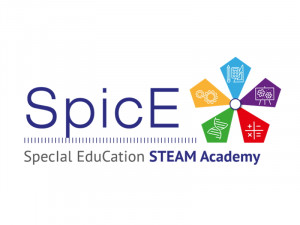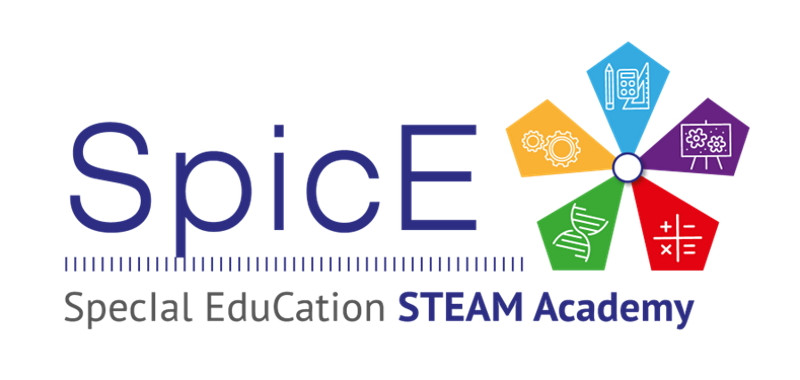 The project, implemented by a consortium of 11 public and private organisations from Greece, Cyprus, Spain and Bulgaria, aims at building significant knowledge for students with mild disabilities from educational and social exclusion.
The project, implemented by a consortium of 11 public and private organisations from Greece, Cyprus, Spain and Bulgaria, aims at building significant knowledge for students with mild disabilities from educational and social exclusion.
The Special Education STEAM Academy, that is, the Erasmus+ SpicE Project call on Teacher Academies is an international consortium that has been selected on May, 2022 by the European Education and Culture Executive Agency (EACEA).
This 3-year long project brings together 11 partners from 4 European countries, led by the Hellenic Open University – HOU (Greece), the coordinator, and including the Research Innovation and Development LabPrivate Company – ReadLab (Greece), University of Macedonia – UoM (Greece), University of Alicante – UA (Spain), Sindicat Treballadores i Treballadors Ensenyament del Pais Valencià Intersindical Valenciana –STEPV (Spain), Sindikat Obrazovanie Kam Kt Podkrepa – TUT (Bulgaria), Trakia Universitet – TUNI (Bulgaria), Osnovno Uchilishte Hristo Smirnenski – OUHS (Bulgaria), University of Cyprus – UCY (Cyprus), Ministry of Education, Sports and Youth – MOESY (Cyprus), and the Regional Directorate of Eduucation of Western Greece –RDEWG (Greece).
At present, inclusive economy based on knowledge and innovation is a high-stake demand for Europe. Professionals in the fields of Science, Engineering and Information and Communications Technology, as well as ICT workers are required and will be in demand in almost every economic area. However, the supply of graduates in ICT and STEM fields (Science, Technology, Engineering and Math) falls short of meeting the increasing demand.
Despite the recognised merits of STEAM Education –an approach to learning that uses Science, Technology, Engineering, the Arts and Mathematics as access points for guiding student inquiry, dialogue, and critical thinking–, converging evidence shows that it is not adequately promoted throughout EU countries. Students with “Mild Disabilities” are deprived of the opportunity to benefit from the advantages connected to its use. Due to their learning problems, these students face considerable difficulties acquiring essential knowledge and skills in many domains, including those making up the STEAM Education package. The lack of STEAM knowledge adversely affects these students’ professional perspectives and work- related opportunities in a world heavily dependent on STEAM skills. Therefore, STEAM education is an ongoing opportunity for pupils in primary education to employ skills such as problem-solving and critical thinking interactively.
Thus, this project’s agenda focuses on the promotion of STEM disciplines through the development of STEAM education. SpicE’s bundle of actions aims to enhance Primary Education Teachers’ ability to implement effective STEAM tools in education and to protect students with Mild Disabilities (Special Education) from educational and social exclusion.
As a result, more than 200 teachers and Higher Education students entering the job market in these 4 EU target countries will be trained to support students to develop digital skills through hands-on activity and an action-learning and game-based environment, which will potentially increase digital literacy and expand future career opportunities to beneficiaries.
The expected outcomes include the improvement of teacher education policies and practices in Europe, the enhancement of the European dimension and internationalisation of teacher education, the development of different models of mobility, as well as a sustainable collaboration.
These objectives will be achieved by developing competence and an education framework for STEAM in Special Education, designing an innovative Joint STEAM Curriculum for Special Education and a STEAM Training Programme, which will be further assessed, and creating and nurturing a sustainable Community of Practice.
Ultimately, all these efforts will be made to achieve a proper inclusion of students with disabilities by identifying the necessary competences, which will be linked to the Digital Competence Framework for Educators (DigCompEdu), and we will produce job profiles compatible with ESCO and mapped to EQF/NGFs. These outcomes will also benefit stakeholders, including teachers, researchers, policy makers, etc.
Therefore, understanding and raising awareness of the need to promote and enhance digital skills, STEM studies and entrepreneurship in Special Education is essential in order to undertake an ambitious STEAM-oriented project such as SpicE in the European context.
For more information, visit the project’s website: spiceacademy.eu or check out its social media on Facebook, Twitter and YouTube at @SpicEAcademyEU.

